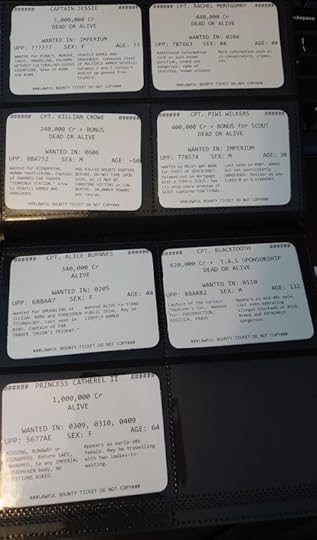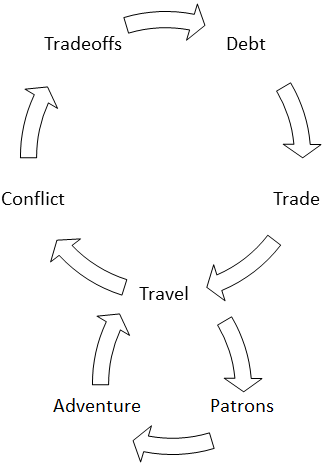On the Four Table Legs of Traveller, Leg 2: Patrons
In part 1
of this series, I described how Mongoose Traveller’s
spaceship mortgage rule becomes the drive for adventure and action in a
spacefaring sandbox, and the ‘autonomous’ gameplay loop that follows.
In this
part, I’ll talk about the Patrons—questgivers—that are baked into Traveller’s gameplay loop and provide
opportunities for more 'traditional’ (that is, pre-scripted) adventures.
Patrons
are, essentially, adventure hooks. The 'default’ premise is that an NPC offers
to hire the party for a job (the reward for which is scaled to the PC’s
spaceship’s cargo hold, so is always competitive with trading for money
making). The job rarely goes as planned, and the patron is rarely on the
up-and-up, so various twists and turns are ensured as the party attempts to
complete the job. These jobs usually require putting the trade 'loop’ on hold
and doing something else (in fact, they’re
virtually the only incentive to get out of your spaceship) and are basically
the gateway to all gameplay that doesn’t involve trading, pirates, and FTL
travel.
“Patron”
is literally entry in Traveller’s
random encounter tables, which provides a way for them to enter the campaign,
but it’s also the kind of thing that can easily just be included by the DM,
regardless of what the table says.
Traveller comes with a handful of
pre-made patrons, plus tables for generating your own, though I think, as
implemented, it’s actually the weakest part of the game’s procedural content
generation, as the ones provided aren’t tailored in any way to the subsector
involved. Additionally, each one could really use several pages of additional
information (for example, “First Lander Thu, Miner,” comes to the
party to ask them to investigate attacks made on his nomadic asteroid mining
clan…
…and that’s really all the guidance the DM gets.
Investigating an attack like that is way beyond
my ability to improvise in real-time at the table. I would need maps,
descriptions of supporting NPCs, clues, red herrings, space stations, and who
knows what else to run that around the table.
So this is a case where, as a DM, you kind of have to roll
up your sleeves and do traditional RPG-esque prep: writing adventures, mapping
derelict space stations, planning mysteries, and so on. This obviously takes a
lot of work, so you can’t easily have dozens and dozens of these up your
sleeves. This is why I like to pad out my Patrons with…
Like
everyone else in the world, I saw the
Mandalorean this year, so had bounty hunters on the mind. I realized the
need for a quick and dirty Patron-replacement (as, again, Patrons are a lot of
work that I’m just not up to these days beyond very sparingly), so introduced
the concept of a “bounty ticket.” This is my first Traveller “house rule,” though
in many ways, it’s more like a campaign setting quirk.

Pictured: bounty
tickets. Each is the size of a playing card, and I keep them in a little folder
intended for holding magic cards and stuff.
Bounty
tickets are Player handouts. Nothing generates excitement like passing around a
paper handout. In-game, they’re essentially wanted-posters that are faxed
directly to the spaceships of bounty hunters and travellers as they’re issued
(meaning that I literally pull out the card and give it to the players as,
in-game, it prints out on their ship’s bridge). These involve much less prep than patrons (most of my
Bounty Tickets are literally “go here, beat this guy, bring him/her back
to this location”). For most of these, I don’t have any DM notes other
than the card itself (they usually give enough game information, like location
and spaceship classes, that I can make up the narrative stuff on the fly). A
few more complex ones have a few lines of notes in my binder about twists,
secrets, ambushes, etc., but I mostly keep it pretty minimal. This isn’t
necessarily a recommendation, it’s just something that I know about myself as
DM: I’m pretty good at making up NPC personalities on the fly, but not names (I
once ran an urban fantasy campaign in which I had five NPCs named
“Frank” or “Frankie”) or stats (except in D&D 3.5
specifically, because I was very cool in high school and as such have the text
of that game imprinted onto my immortal soul).
I really
went paper-crafts crazy the other day and made a bunch of little handout cards
(some with emails to the PC from their contacts/rivals, some with stats for
various commonly-occurring spacecraft and stuff. I was about to print out a
little card for each weapon in the rulebook before I made myself stop). The
other relevant ones are 'encounter cards,’ which are basically pre-generated
random encounters/events that are a little more complex than the ones that
result from the table. These are written with an audience of me in mind, so use
shorthand and skim over bits that I know I’m confident improvising around the
table.
None of
these are technically 'patrons’, but all serve the same purpose of injecting
hand-made content into the game’s procedural content generation to keep things
fresh.
Crucial to making Patrons (and “Patrons”)
work is scaling the rewards correctly. Contrary to most of my DM instincts,
this means erring on the side of too much
money rather than too little. In D&D, too high of a reward leads to
characters that get too powerful, while too low of a reward can be easily
compensated for by the DM later with more generous treasure. In Traveller, the prize for doing the task
has to be higher than (or at least comparable to) what the party could make
doing trading in that same amount of in-game time, or they literally won’t be
able to afford going on the adventure.
The book recommends something like 1,000-2,000cr per ton of cargo on the PC’s
ship per week of work needed, which is a good starting place, but I’d add even
more if the job requires space combat (as damage to spaceships can be very
expensive, and worse, time-consuming, to repair). That’s why the rewards for my
bounty tickets are quite high; most of them involve risking the PCs’ spaceship
to achieve.
In my
experience, there’s so many ultra-expensive things in Traveller for PCs to waste/spend money on that you shouldn’t overly
worry about giving them too much money all in one go. Meaningful spaceship
upgrades are in the millions of credits, and there’s almost always something on
the ship that can be improved, so that money will leave their pockets soon
enough.

Patrons
(which are, by default, encountered simply through travelling) add a sub-loop
to the Traveller gameplay 'loop’.
They lead to adventures (which can include anything:
Fencing, fighting, torture, revenge, giants,
monsters, chases, escapes, true love,
miracles…) but that ultimately deposits the party back in the core loop,
ideally with their wallets padded with a huge cash reward (which will quickly
be taken by the bank).
Essentially, this is how you include anything in a Traveller campaign that can’t be easily
generated on a random table. Unlike in most other RPGs, this is more like a
spice, added sparingly, rather than parmesan cheese, which is eaten in a 1:1
ratio with the noodles underneath it. (You guys do that too, right?). The
'loop’ provides enough fun around the table while running on autopilot (DMing
players zooming about the subsector mostly just involves rolling on and
adjudicating the results of random tables) that you can afford to be very
sparing with prep-work on Patrons.
Next up
we’ll cover how Traveller’s (in)famous
character creation ties into these other systems.
Sir Poley's Blog
- Sir Poley's profile
- 21 followers



